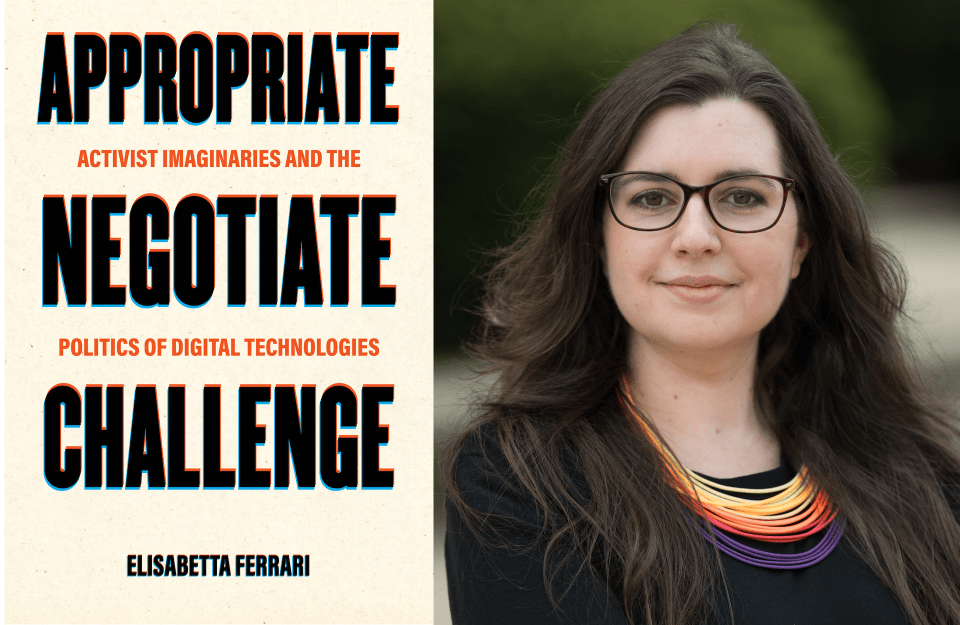Appropriate, Negotiate, Challenge: Q&A with Elisabetta Ferrari (Ph.D. ‘19)
In her debut book, the Aarhus University assistant professor delves into how social movements use technology in their struggles for social change.

Elisabetta Ferrari
Many contemporary activist groups rely on social media platforms to organize events and send their messages to the masses, even when they disagree with the politics of these platforms — how they are used to surveil activists and disseminate disinformation, racism, and abuse.
In her new book, Appropriate, Negotiate, Challenge: Activist Imaginaries and the Politics of Digital Technologies, Annenberg alumnus Elisabetta Ferrari (Ph.D. ‘19) explores the fraught relationship between social movements and digital media, looking into how three leftist activist groups reckon with online spaces that do not always reflect their politics.
She examines social movements in three countries: the Italian student collective LUMe (Laboratorio Universitario Metropolitano), the 2014 Hungarian internet tax protests, and the U.S.-based Philly Socialists.
In speaking with these activists, Ferrari finds that though the Silicon Valley values of big tech are at odds with their mission, they feel reliant on the platforms to make connections and share information.
We recently spoke to Ferrari, AIAS-AUFF Fellow at the Aarhus Institute of Advanced Studies (AIAS) at Aarhus University, about the book, available now from University of California Press.
Can you tell us a bit about each of the groups featured in your book? How did you come across them, and why did you choose to study them?
I studied activists in three different countries: Hungary, Italy, and the U.S. My research began with the activists who organized the “internet tax” protests in Hungary in 2014 in response to a proposal of Viktor Orbán’s right-wing government that wanted to tax internet consumption. These massive demonstrations — turning up 100,000 people — not only led to the withdrawal of the tax proposal but also gave voice to a more general opposition to Orbán; its organizers went on to participate in other pro-democracy movements in Hungary.
The second case is an Italian anti-capitalist student movement called LUMe (Metropolitan University Laboratory), based in Milan. This collective is an example of an Italian-occupied social center: activist groups who occupy unused buildings for political and cultural purposes.
The third case is a U.S.-based socialist group, the Philly Socialists, located in Philadelphia. The Philly Socialists were founded in 2011 but grew rapidly during the first Trump presidency when socialist organizing became more recognized throughout the U.S.
I consider the groups I studied in the book to be part of a cohort of social movements that emerged to fight back against the rise of right-wing populism across the world in the mid-2010s.
I chose them because they are similar in their political positions and organizational structures, but they are also immersed in political contexts that are very different; I hoped that looking at them side by side would allow me to see how and why they approached digital technology in different ways.
Where does the title “Appropriate, Negotiate, Challenge” come from, and how does it relate to the themes of your book?
In the book, I work with the concept of “technological imaginaries” to make sense of how different actors envision their political relationship to digital technologies. I then reconstruct how activists develop their own activist technological imaginaries in response to what I identify as the dominant technological imaginary of our time – that of Silicon Valley.
The title comes from the three categories of activist imaginaries that I sketch out, based on how activists respond to Silicon Valley’s take on technology. Imaginaries of appropriation are those through which activists accept the imaginary of Silicon Valley and adopt corporate digital technologies like Facebook. The category of negotiation accounts for activist imaginaries that reject the imaginary of Silicon Valley while embracing its technologies, leading to friction and discussions within social movements. Lastly, imaginaries of challenge reject both the technologies and the imaginary of Silicon Valley, with activists moving away from corporate technologies.
What are the main challenges with technology that you saw repeated across activist groups? Since writing the book, have you seen changes in how social movements use technology?
Activists experience digital platforms as inescapable but very problematic: as toxic spaces, full of harassment and abuse, and as constrained and non-democratic spaces, where it is difficult to have constructive discussions. These challenges, and many others, are tied to the corporate nature of digital platforms and their need to turn user interactions into profit via datafication and surveillance — something that activists are fully aware of.
Since my research for the book, one of the more interesting, and somewhat puzzling, changes I’ve observed is the growth of Instagram as a platform for radical activists. Despite the known issues with shadowbanning, activists still seem to find Instagram suitable, especially when it comes to political education – talking about the ‘why’ of their activism. The other very clear change is how a lot of activist discussions are now (understandably) hidden from view and taking place on messaging platforms like Signal.
The politics of social media has been thrust into the limelight recently as some tech leaders align themselves with the Trump presidency. Do you predict this will push activist groups to change how they use social media platforms?
I think we are seeing big shifts in real time, as activists — and many “regular” people — move away from Twitter/X and Meta products in recognition of their now explicit alignment with Trump.
As I write in the book, technology has always been political and the politics of Silicon Valley have long been concerning for activists. Despite how much tech entrepreneurs like to see themselves as revolutionaries, the vision of society and politics promoted by the dominant technological imaginary of Silicon Valley is at odds with notions of social justice. But I think we still have a long way to go before we can dismantle the discursive and material power that Silicon Valley holds.
How has your time at Annenberg helped you in your current career?
I learned so much during my time at Annenberg — and not just about how to do research and teach.
There are two aspects, in particular, that I think about a lot as I navigate my career. One is the importance of building a community of people. I was so lucky at Annenberg to have incredible colleagues, friends, and mentors, whose support I feel even now; they are still the people I go to when I need help wrangling my ideas. The second is about being open to following your curiosity and questions about the world, even when they take you beyond the boundaries of your academic discipline.
These days, I work in an interdisciplinary environment where my colleagues are biologists, linguists, and philosophers, and I think Annenberg’s openness to learning from other disciplines has certainly helped me feel at home in these spaces.



